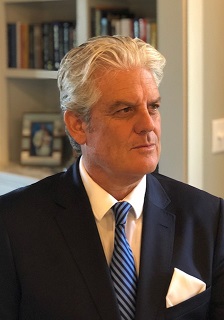From the CEO – June 2021
 Dear Clients,
Dear Clients,
During client calls and sometimes in conversation about the influence of political risk on investments, I’m asked about the real or measurable impact of adverse effects of politically motivated actions. Not the esoteric stuff of the ‘talking head’ crowd about, say, the possible consequences of strike activity on mining operations in Africa (which, admittedly, is sometimes little more than informed conjecture from those that may or may not have direct experience ‘on the ground’). I mean the more tangible stuff – the kinds of risks that can be measured by financial losses and ideally codified within a framework of risks, ranking those that are most likely to generate the loss. This is the real value of political risk. And if such efforts can be done across jurisdictions and across time, the significance it holds for the investor, the corporate planner, or the serious academic is substantial.
Perhaps the closest we have come to this goal is contained in an excellent chapter in our new book, Quid Periculum? Measuring & Managing Political Risk in the Age of Uncertainty, co-edited and co-authored by me and Peter Marber (Harvard, Aperture Investors) and written by researchers Vincent Arel-Bundock, Clint Peinhardt, and Amy Pond. It’s well worth the read, as are all of the other chapters of the book.
The authors begin by analyzing one of the largest datasets available: more than 5,000 political risk contracts issued by the US Overseas Private Investment Corporation (OPIC) over nearly 50 years, and the filed claims under these contracts. Distinguishing between risks at the national versus firm level, attention is given to the risk of expropriation, transfer, and political violence.
Using negative binominal regression models with multiple inputs, among the major findings are: higher claims correspond to changes in political leadership (most notably the result of shaky coalition governments), social turmoil/ violence, expropriation (e.g., resource rents) and economic crises (which are associated with inconvertibility claims). The authors also found that countries with more open capital accounts tend to experience lower claims, possibly related to compensation paid by governments and the firm’s ability to exit the country and repatriate capital.
Food for thought, to be sure. And the findings certainly make the case for the use of a well-defined and back-tested geopolitical risk methodology, covering a range of developed, emerging, and frontier markets over a credible period of time.
Turning to the ratings this month a few standouts are worth mentioning. In the Americas, consumer confidence in Argentina is bottoming out, as C’19 cases ease and as the authorities use the Paris Club to extend debt talks. Conversely, C’19 infections are on the rise in Uruguay, with the potential for higher levels of social turmoil. The poverty rate now sits at 12%.
In Western Europe, the majority of those polled in Cyprus think the governing authorities are corrupt, which has been made worse by the pandemic. Similarly, about 40% of those surveyed in Hungary feel corruption is a serious issue. The main political parties are polling closely.
Turning to Asia, overall stability has returned to Mongolia as the Chair of ruling Mongolian People’s Party – and former PM – Khurelsukh won the presidential vote by a large margin: 67% of votes. The MPP also controls the legislature. Contrariwise, the specter of civil war has increased in Myanmar as civilian forces are training with ethnic armed groups and setting up cells in the cities. They will face a formidably armed military.
Over in Africa, C’19 cases in Kenya have dropped, and President Kenyatta’s approval rating is just above 50%. Demand and production numbers for May are up as the country leads the region on these metrics. Conversely, in Uganda, the evident surge in variants and lack of vaccines has increased the risk of a renewed series of protests. But security forces will respond accordingly. There are about four months of cover via foreign exchange reserves, but caution is required as there have been large drawdowns of late (to fund the import bill) and USD receipts have eased.
In Eastern Europe, the US has expanded the scope of sanctions against Albanian individuals for their connection to various corruption scandals. In Armenia, acting PM Pashinyan’s Civil Contract party garnered 71 seats in the new parliament, while Armenia bloc of former President Robert Kocharyan pulled in 29 seats (of a total of 107 seats). There was a general distaste among the electorate for Pashinyan but even more for the past political leaders. With the election out of the way, regional relations expected to improve.
Finally, in the Middle East, Algeria’s legislative tally saw the ruling National Liberation Front (FLN) falling short of a majority in parliament, with a large number of Islamists/independents elected. Most of the new legislators should support the president’s policy goals. Look for Algeria’s security forces to up the ante against journalists and dissent. Israel’s new PM, Naftali Bennett, should usher in a little more government stability over the next two-years. Ideologically, Bennett sits to the right of Bibi – and is critical of the ‘two-state solution’ – but leads a diverse coalition including an Arab party. The ceasefire appears to be holding.
Our new book Quid Periculum? Measuring & Managing Political Risk in the Age of Uncertainty, co-edited and co-authored by Peter Marber (Harvard/Aperture Investors) is now available! The book includes such diverse topics as risk forecasting techniques, reliability measures, the impact of political risk on asset prices and sovereign debt workouts. Also featured is a special roundtable discussion by some of the world’s leading voices in the field on the future of political risk, who combine to address some of the challenges presented by globalization and COVID-19. For more information and to reserve a copy of the book, please contact Louis Carroll, PRS’ Director of Business Development, at lcarroll@prsgroup.com or purchase online.
June was another productive month for new and returning clients, ranging from some of the world’s top universities to the largest institutional investors throughout the US, Europe, the UK, and the Middle East and Asia.
We are also pleased to be concluding our preliminary assessment of Uzbekistan’s risk profile for the Finance Ministry with our June data to bring that country into the ICRG fold and have it ranked alongside the 140 countries contained in the index.
We are also happy to be working with Elanco – a world leader in developing innovative products and solutions that enhance animal health – to provide select risk profiles of a number of Asian countries not covered by PRS. With Elanco, our client base continues to expand to include firms from a variety of commercial backgrounds as our data and risk forecasting next to no other in terms of its multiple applications.
New firm-wide work has begun with one of the largest financial and insurance firms based in NYC, which serves over 80% of the Fortune 500 companies. The goal is to use ICRG data in portfolio construction and as a tactical input into trading, underscoring the connection in the ICRG data between geopolitical risk and the performance of various asset classes.
A similar effort for a multi-year data arrangement is underway with one of Asia’s largest state-owned oil companies, which focuses largely on offshore exploration and extraction in the region. It’s very satisfying to provide political risk data to enterprises that are part of a country’s larger foreign policy goals and economic development. On this score, PRS stands alone among other risk rating firms.
Not only is ICRG being used by some of the world’s largest technology firms, but the data are now being incorporated increasingly into the artificial intelligence/machine learning space, with an emphasis on ESG data! On this score, we are especially pleased that our data are being used by an increasing number of institutional investors as the empirical connection between our select risk indicators and various asset classes become more pronounced and tradable. Be sure to contact us for our select ESG data bundles.
We are also delighted to mention that PRS will be completing its re-branding process this year which will include a new look that pays homage to our 40+ year history, along with various events that helped lay the foundation for our work – some of which extend to the introduction of the Hindu Arabic number system in the Renaissance period and a now famous exchange of letters between Blaise Pascal and Pierre de Fermat in 1654. As part of the new-look at PRS, we will continue to unveil new products which include data bundles of particular importance to the academic world and more timely country risk forecasts available online.
Our ICRG political risk scoring changes were very robust in June, affecting some 90 countries (of 140) and over 120 individual political risk metrics!!
ICRG and related PRS data continue to be the gold standard of all geopolitical risk data among the scholarly and research communities. Using select ICRG data on political support and an a proxy index for internal conflict, a recent IMF Working Paper asked whether Climate Change Policies (CCP) reduced popular support for governments, and whether this support varied depending on whether the policies are market-based (emission taxes) or non-market based? And what are the political costs of CCPs in the context of high energy costs and significant social inequality? The conclusions are noteworthy indeed! (https://lnkd.in/dvtxYdz)
Additionally, using a series of ICRG risk metrics, it appears that over-optimism with respect to a country’s growth prospects makes recessions, fiscal problems, and balance of payment difficulties more likely. The mechanism seems to run through higher debt accumulation (both public and private), which leads to a build-up of fragilities in the system to harm future growth. (https://lnkd.in/en4pZUm)
Thanks for your continued support, and please contact us if we can be of any assistance.

Chief Executive

PRS INSIGHTS
Moving beyond current opinions, a seasoned look into the most pressing issues affecting geopolitical risk today.
EXPLORE INSIGHTS SUBSCRIBE TO INSIGHTS
